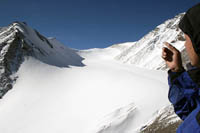 Tibetan riots aren’t the only crisis the government faces in western China. A couple hundred kilometers north of Lhasa, the Xinjiang capital is struggling with an ominous climate change problem that appears to be threatening its very existence. From China Dialogue:
Tibetan riots aren’t the only crisis the government faces in western China. A couple hundred kilometers north of Lhasa, the Xinjiang capital is struggling with an ominous climate change problem that appears to be threatening its very existence. From China Dialogue:
Urumqi would seem relatively safe from the more immediate threats of climate change. Located roughly halfway between Beijing and Baghdad, at the foot of the Tianshan (“Heavenly Mountain”) Range near the northern end of the Qinghai-Tibet Plateau, the city sits at far remove from the dangers of rising seas and intensified coastal storms—farther removed than any city on earth, in fact. But if residents of this former Silk Road outpost have a hard time sympathizing with the frantic dike builders of the Netherlands’ sub-tidal Zuidplaspolder, they occupy no less precarious a position on the map of potential climate catastrophe.
The danger to Urumqi comes not from climate change alone, but from a lethal coincidence of the effects of global warming and the needs of another seemingly unstoppable force: Chinese economic development. According to government calculations, average temperatures in Xinjiang have risen by as much as 1.6 degrees Celsius since the 1980s, three times the average rate of warming for the northern hemisphere. As a result, the region’s glaciers have been melting with astonishing speed. For one of Asia’s most glacier-dependent cities, that is decidedly bad news. But for a perpetually parched settlement high on the government’s list of economic priorities—the locus of a multi-billion dollar “megacity” development effort featuring, among other things, golf courses and ski resorts—the sudden availability of excess glacial melt water is also good news.
While climate change typically scares people into rethinking the wasteful old models of development, in Urumqi rising temperatures appear to be the factor that makes the old model feasible. That has experts nervous. “You can support this type of expansion in the short term,” renowned glaciologist Lonnie Thompson says of the city’s plans. “But in the long term, you will find yourself in deep trouble.”
One of the authors of the article has posted photos and from the glaciers here.







